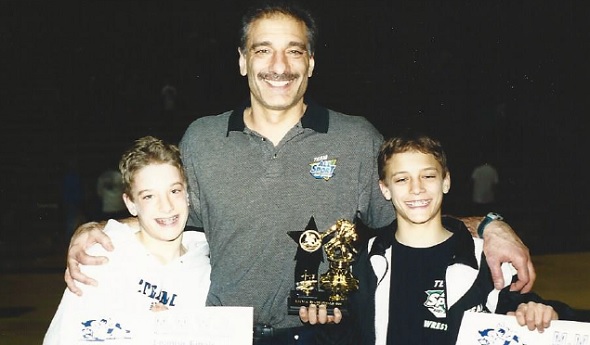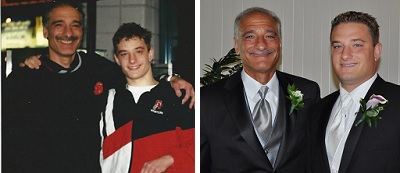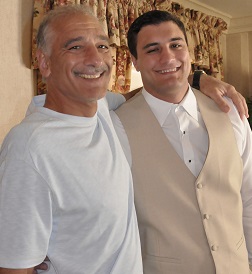
Coaching Cousins Build on Macomb Roots
By
Tom Markowski
Special for Second Half
January 18, 2018
MACOMB – Success must begin somewhere.
 And for the Macomb Dakota wrestling program, its beginnings can be traced to a church in Mount Clemens nearly 25 years ago.
And for the Macomb Dakota wrestling program, its beginnings can be traced to a church in Mount Clemens nearly 25 years ago.
Ed Skowneski, a longtime educator in Macomb County who was a football star at Wayne State University during the 1970s, got with a few buddies and formed a youth wrestling program named the Bad Boys Wrestling Club.
This program would eventually produce six MHSAA champions and approximately 20 others who reached the Individual Finals. It also helped inspire two of those wrestlers to become coaches at the high school level.
Eddie Skowneski, Ed's son, leads the Macomb Dakota program ranked No. 3 in Division 1 this week by Michigan Grappler. Nephew Anthony Biondo assists top-ranked Detroit Catholic Central.
Before the Bad Boys – which would eventually evolve into Team All Sport – there were pockets in the county where the sport thrived, such as Fraser High where Al Kastl had built a strong program. But for the most part, Macomb County was a step or two behind nearby counties such as Genesee, Lapeer, Oakland and Wayne, where the sport had well-established programs like Clarkston, Davison, Detroit Catholic Central, Hazel Park, Lake Orion, Montrose, New Lothrop and others.
Skowneski teamed with people like Bob Palazzolo, Rick Julien – an assistant under Kastl at Fraser who later became Fraser’s head coach – and later, Vince Biondo, Skowneski’s roommate in college, to organize a competitive youth program.
“We had some good kids back then,” Skowneski said. “We had six state champions come out of there. We practiced twice a week at the church, but it was more like a hall or reception room. After one year we moved to Fraser, Mark Twain Elementary (School), where I was a principal. That made it easier, for travel and everything. We had our own mats in the school, and it started to grow.”
 A team from Macomb County has yet to reach an MHSAA Division 1 Final, but they’re getting close. Last season Dakota reached a Division 1 Semifinal for the first time, and it was just the third time a Macomb County team had advanced that far in the top division/classification.
A team from Macomb County has yet to reach an MHSAA Division 1 Final, but they’re getting close. Last season Dakota reached a Division 1 Semifinal for the first time, and it was just the third time a Macomb County team had advanced that far in the top division/classification.
Two other county schools fared well last season, too, in other divisions. Warren Woods Tower lost in the Division 2 Final to Lowell, and Richmond won the Division 3 title.
Skowneski’s motivation to become a coach came from his son, Eddie, and, later, his nephew Anthony Biondo, Vince Biondo’s son. Eddie Skowneski got his start with the Bad Boys at age 9 with his cousin who is two years younger. The two became best friends and would become two of the county’s top wrestlers during the early to mid-2000s at Clinton Township Chippewa Valley.
Each would reach the Individual Finals three times. In 2003, Skowneski won the 140-pound title over fellow county wrestler Justin Petrone of Roseville, 1-0. Biondo was a three-time champion placing first at 103 in 2003, first at 112 the next season and first at 145 in 2006.
Skowneski would earn a scholarship to Michigan State University, where he was a three-year starter. Biondo went to University of Michigan and was a three-time NCAA Tournament qualifier. His best season came as a senior when he went 2-2 at the NCAAs and earned his 100th career win.
“Those Bad Boys days, those were some great times,” Anthony Biondo said. “It was a great group of kids. I just remember being in that church with Uncle Ed. I really wasn’t into wrestling when I started. I was into hockey and football. I started going there one day a week, and it just grew. My first year wrestling (at Chippewa Valley), I won the state title. It was just that one-on-one thing that I liked. My dad was a huge goal-setting type of guy, and I just kept at it.”
 Their wrestling careers didn’t stop after graduation. Skowneski became an assistant coach at Fraser for one season then went to Warren DeLaSalle for two as an assistant before becoming the head coach at Dakota in 2012. Biondo is in his seventh season as an assistant coach at Detroit Catholic Central, the top-ranked team and reigning champion in Division 1.
Their wrestling careers didn’t stop after graduation. Skowneski became an assistant coach at Fraser for one season then went to Warren DeLaSalle for two as an assistant before becoming the head coach at Dakota in 2012. Biondo is in his seventh season as an assistant coach at Detroit Catholic Central, the top-ranked team and reigning champion in Division 1.
Eddie Skowneski, 31, said he’s had a number of mentors throughout his wrestling career who have contributed to him becoming the coach he is today. His father is one, but he also said his high school coach John Jeffire at Chippewa Valley, St. Clair Shores Lakeview football coach Pat Threet and his college coaches all have had their influence.
When Ed Skowneski retired as school principal at Mark Twain in 2015, his son quickly found him a part-time job as his assistant at Dakota to keep him active.
“He’s always been a great coach,” Eddie said. “Coaching with my dad, it never really stopped. With him, it’s the little things. He always said, if you have good technique, you can beat someone who is more physical than you are. With my dad, he goes to each person and shows them the proper technique. With me, sure I want them to work and train hard. But I want my wrestlers to do it the right way.”
Ed Skowneski got out of coaching when his son went to high school. He said he had taken his son as far as he could and that it was better to have Eddie continue his progression with someone else as his coach.
Now that Ed’s back in it, coaching with his son no less, he couldn’t be happier.
“When he first got the job at Dakota, I thought of helping him but I just didn’t have the time,” Ed Skowneski said. “I’m enjoying it now. I’m not the head coach. He has the issues. I just work with the kids. It’s fantastic. It’s rewarding. We have a great group of kids and good parents.
“I look forward to the tournaments, which sometimes keeps me up at night. It’s nice that my son and I can do this together.”
 Tom Markowski is a columnist and directs website coverage for the State Champs! Sports Network. He previously covered primarily high school sports for the The Detroit News from 1984-2014, focusing on the Detroit area and contributing to statewide coverage of football and basketball. Contact him at [email protected] with story ideas for Oakland, Macomb and Wayne counties.
Tom Markowski is a columnist and directs website coverage for the State Champs! Sports Network. He previously covered primarily high school sports for the The Detroit News from 1984-2014, focusing on the Detroit area and contributing to statewide coverage of football and basketball. Contact him at [email protected] with story ideas for Oakland, Macomb and Wayne counties.
PHOTOS: Longtime coach Ed Skowneski stands with son Eddie (left) and nephew Anthony Biondo after a youth event when they were children. (Middle) Father and son hold up Eddie’s bracket sheet after he won the Division 1 championship at 145 pounds in 2006; to the right, they pose together during Biondo’s wedding. (Below) Ed Skowneski and Biondo, also before the latter’s wedding. (Photos provided by the Skowneski family.)

Rep Council Wrap-Up: Winter 2015
April 1, 2015
By Geoff Kimmerly
Second Half editor
The selection of a new venue for its Team Wrestling Finals highlighted actions taken by the Representative Council of the Michigan High School Athletic Association during its annual Winter Meeting on March 27 in East Lansing.
The Team Wrestling Finals will be hosted by McGuirk Arena at Central Michigan University in Mount Pleasant for two years beginning with the 2016 tournament. The Team Wrestling Finals previously had been hosted by Kellogg Arena in Battle Creek since their inception in 1988.
McGuirk, formerly Rose Arena, is part of the CMU Events Center and reopened in 2010 after the facility underwent $22.5 million in renovations. McGuirk seats 4,867 fans for wrestling competitions, and the building also features adjacent practice areas that will be utilized by teams competing at the MHSAA Finals.
Rose Arena formerly served as host of the MHSAA Girls Basketball Finals from 1997-2003.
“We are grateful to the athletic directors, staff and volunteers whose time and energy factored heavily into creating and growing the Team Wrestling Finals at Kellogg Arena,” MHSAA Executive Director John E. “Jack” Roberts said. “The decision to move from Battle Creek was not an easy one. However, we believe Central Michigan University offers us a fantastic opportunity to continue growing one of our most popular championship events.”
The Representative Council also continued discussions on three issues which may require action at meetings later this calendar year.
Continuing its examination of athletics at the junior high/middle school level, the Council discussed recommendations submitted by the MHSAA’s Junior High/Middle School Committee, including one which may come up for vote at the Council’s May meeting. It is a request for a membership vote to amend the MHSAA Constitution to allow for school membership beginning at the 6th grade. If the Council approves, the amendment vote likely would occur in late October after another round of membership meetings.
The Council also continued its discussion of potential changes to out-of-season coaching rules and considered results of surveys taken during the MHSAA’s Update Meetings in the fall and by athletic directors and leaders of leagues and conferences during the late fall and winter. The major changes in rules that were proposed for discussion last summer have not gained traction with the MHSAA membership, but three modifications intended to give school coaches longer and more flexible contact with their student-athletes out of season during the school year will receive Council action in May.
Continuing its work regarding the eligibility of international students, the Council also approved that MHSAA staff continue reviewing school-operated international student programs for the purpose of granting students athletic eligibility at MHSAA schools. A proposal first approved at the March 2014 meeting granted the MHSAA authority to grant athletic eligibility to students placed through an Approved International Student Program that had not been accepted for listing by the Council on Standards for International Educational Travel (CSIET), so long as that Approved International Student Program is not eligible for CSIET consideration and listing. CSIET will only review existing programs, but the MHSAA’s supplemental process will allow programs too new for the CSIET process to gain approval for 2015-16.
Those international students placed through an Approved International Student Program are eligible for a maximum of the first two consecutive semesters or three consecutive trimesters at any secondary school in the United States, after which the student is ineligible for interscholastic athletic competition at any MHSAA member school for the next academic year. International students who do not meet one of the residency exceptions recognized by the MHSAA or are not enrolled through an Approved International Student Program or CSIET-listed program may become eligible after one semester to participate at the subvarsity level only.
The Representative Council is the legislative body of the MHSAA. All but five members are elected by member schools. Four members are appointed by the Council to facilitate representation of females and minorities, and the 19th position is occupied by the Superintendent of Public Instruction or designee.
The MHSAA is a private, not-for-profit corporation of voluntary membership by more than 1,400 public and private senior high schools and junior high/middle schools which exists to develop common rules for athletic eligibility and competition. No government funds or tax dollars support the MHSAA, which was the first such association nationally to not accept membership dues or tournament entry fees from schools. Member schools which enforce these rules are permitted to participate in MHSAA tournaments, which attract more than 1.4 million spectators each year.

